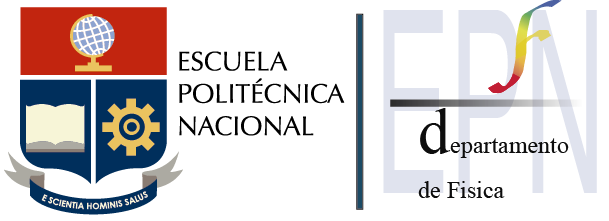Escuela de Programación para Investigación Científica - EPIC II
Escuela Politécnica Nacional
English:
The "Grupo de Investigadores Latitud Cero", the "Departamento de Física de la Escuela Politécnica Nacional" and the "Departamento de Física de la universidad Yachay Tech" are co-organizing the new series of the EPIC (Escuela de Programación para Investigación Científica) summer schools.
The second edition of EPIC will focus on introducing techniques for data analysis using python and julia as the main tools. The school will take place in virtual mode in October 2022.
At the end of this workshop, students will be able to perform basic data analysis of unprocessed raw data to extract important information about physical systems.
The number of participants is limited to the 20 highest motivated students. Preference will be given to the students of last semesters. Thanks for your understanding.
Selected students from the last years will have the opportunity to present their own research work during a dedicated session.
Date: From October 10, 2022 to October 14, 2022
Duration: 5 days including 1 preparatory session and 6 tutorial sessions
Format: Online (zoom)
Requirements and registration:
- Complete the registration form in Indico.
- A motivation letter (maximum 200 words) to be filled in the registry.
Recommended prerequisites:
- Basic programming experience.
- Basic knowledge of the English language.
Español:
El Grupo de Investigadores Latitud Cero, el Departamento de Física de la Escuela Politécnica Nacional y el Departamento de Física de la universidad Yachay Tech tienen el agrado de presentar la escuela de verano EPIC (Escuela de Programación para Investigación Científica). La escuela tendrá lugar de manera virtual durante la segunda semana de Octubre del 2022.
La segunda edición de EPIC se centrará en la introducción de técnicas para el análisis de datos utilizando Python y Julia como herramientas principales. Al final de este taller, los estudiantes podrán realizar análisis utilizando datos sin procesar para extraer información de parámetros sobre sistemas físicos.
El número de participantes se limita a los 20 estudiantes más motivados. Se dará preferencia a los alumnos de los últimos semestres. Gracias por su comprensión.
Los estudiantes seleccionados de los últimos semestres tendrán la oportunidad (opcional) de presentar su propio trabajo de investigación durante una sesión dedicada para este propósito.
Fecha: Del 10 de octubre de 2022 al 14 de octubre de 2022
Formato: En línea (Zoom)
Duración: 5 días que incluyen 1 sesión preparatoria y 6 sesiones a modo de tutoriales
Certificado: En formato digital pdf
La emisión de un certificado dependerá de la entrega de un código al final de la Escuela.
Requisitos y registro:
Completar la hoja de registro en Indico.
Una carta de motivación (máximo 200 palabras) que debe ser llenada durante el registro.
Pre-requisitos recomendados:
Experiencia básica en programación.
Conocimiento básico del idioma inglés.
Organizadores:


